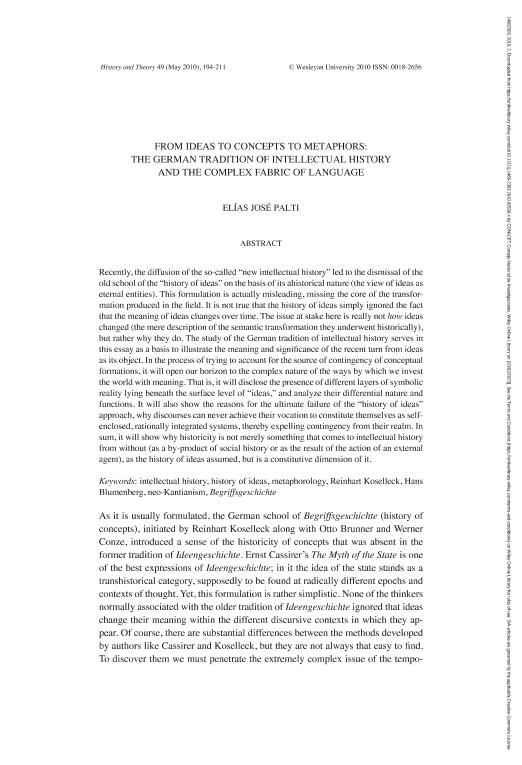Artículo
From ideas to concepts to metaphors: The German tradition of intellectual history and the complex fabric of language
Fecha de publicación:
05/2010
Editorial:
Wiley
Revista:
History and Theory
ISSN:
0018-2656
Idioma:
Inglés
Tipo de recurso:
Artículo publicado
Clasificación temática:
Resumen
Recently, the diffusion of the so-called "new intellectual history" led to the dismissal of the old school of the "history of ideas" on the basis of its ahistorical nature (the view of ideas as eternal entities). This formulation is actually misleading, missing the core of the transformation produced in the field. It is not true that the history of ideas simply ignored the fact that the meaning of ideas changes over time. The issue at stake here is really not how ideas changed (the mere description of the semantic transformation they underwent historically), but rather why they do. The study of the German tradition of intellectual history serves in this essay as a basis to illustrate the meaning and significance of the recent turn from ideas as its object. In the process of trying to account for the source of contingency of conceptual formations, it will open our horizon to the complex nature of the ways by which we invest the world with meaning. That is, it will disclose the presence of different layers of symbolic reality lying beneath the surface level of "ideas," and analyze their differential nature and functions. It will also show the reasons for the ultimate failure of the "history of ideas" approach, why discourses can never achieve their vocation to constitute themselves as self-enclosed, rationally integrated systems, thereby expelling contingency from their realm. In sum, it will show why historicity is not merely something that comes to intellectual history from without (as a by-product of social history or as the result of the action of an external agent), as the history of ideas assumed, but is a constitutive dimension of it.
Archivos asociados
Licencia
Identificadores
Colecciones
Articulos(SEDE CENTRAL)
Articulos de SEDE CENTRAL
Articulos de SEDE CENTRAL
Citación
Palti, Elias Jose; From ideas to concepts to metaphors: The German tradition of intellectual history and the complex fabric of language; Wiley; History and Theory; 49; 2; 5-2010; 194-211
Compartir
Altmétricas




